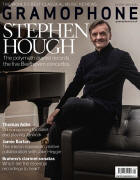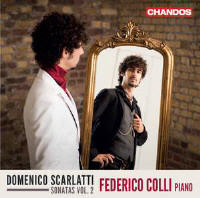Texte paru dans: / Appeared in: Chandos |
|
|
Outil de traduction (Très approximatif) |
|
|
Reviewer: Michelle Assay For his second volume of what is evidently shaping towards a complete survey of all 555 Scarlatti sonatas, the 2012 Leeds Competition winner Federico Colli has set aside his idea of grouping sonatas according to affective or emotional affinities and instead offers his selection of sonatas in pairs. I admit I would have found it hard to approach the rather fanciful themes of the first volume as tactfully as Harriet Smith did in her review of that first volume. So I welcome the new approach, even though it is no less subjective. The decision as to which sonatas should be coupled follows no single model. Rather it is another product of the pianist’s own musical taste. The principle of contrast is evident, even without Colli’s idiosyncratic booklet note and his reflections on the theme of ‘smoothness’ as a dominating element of modern times. His playing is correspondingly individual but a good deal more convincing, at least for the most part. The agogic accents and rubatos in the enchantingly melancholic Kk87, for example, though never as self-indulgent as Pletnev (Virgin/Erato, 3/96), distort the rhythmic canvas; I find a greater integrity and honesty from Sudbin (BIS, 5/05) and even more from Horowitz – particularly the solemn temple he builds of it at the start of his 1986 Moscow concert (DG). When it comes to the morning-dew atmosphere of Kk318 Colli falls somewhere between the straightforwardly sincere Anne Queffélec (Mirare) and the gloriously poetic Sudbin (4/16), who take full advantage of the resources of the modern piano to imitate changes of registration and orchestral colours. When it comes to introducing variations in the repeats, Colli is much more reserved than Sudbin. For the melancholically brooding Kk466, although I prefer Horowitz’s quiet and lean meditation, Colli is full of affectionate lyricism, verging on self-indulgence. If you prefer your Scarlatti straight up, you might object to the Italian’s ‘shaken, not stirred’ recipe. But even purists would surely acknowledge the care and devotion that has gone into each sonata and into the programme as a whole. Overall, Colli’s crystalline clarity and witty exuberance (compare the joie de vie he finds in Kk25 with Pletnev’s highly romantic and syrupy take) make this a thoroughly enjoyable album. |
|




